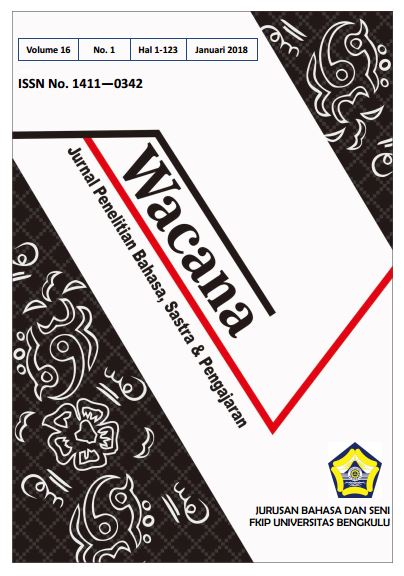Main Article Content
Abstract
The purpose of this study to describes about language politeness, violation of language politeness, language politeness strategy and the marker of language politeness of class VIII students’ at SMP Negeri 01 Bengkulu Utara. This research uses qualitative method. The sources of research data obtained based on the students’ conversation during the learning process, while the research data is recording students’ conversations in the classroom. Data analysis techniques through some stages; (1) Researchers make the recording during the learning process. Conversations recorded in the classroom, there is no limited to specific learning materials, but each learning process in the class room. (2) The researcher copy the recorded conversations into written form. (3) Transcribed data was grouped based on conversations between students-students and students-teachers. (4) The data analysis using the principles of politeness developed by Leech, namely maxim of wisdom, maxim of generosity, maxim of praise, maxim of consent, maxim of generosity and maxim of sympathy. (5) The research conclusions are based on data that has been processed or analyzed. Based on the results of the research (1) The fulfillment of SMPN 01 Bengkulu Utara's language companionship based on Leech's theory found six maxims of politeness in the learning process: maxim of wisdom, maxim of generosity, maxim of praise, maxim of humility, maxim of consent and maxim of sympathy. (2) Violations of students' language politeness are found in maxim of praise, while the other five maxims are not found in violation of politeness. (3) Positive language politeness strategy consists of: giving promise and giving approval. Negative politeness strategies consist of: Demonstrating pessimism, minimizing coercion, asking for forgiveness and impersonal use, and (4) The language modesty markers in the findings of this study are: linguistic markers of politeness and committers.
Keywords:politeness, strategy, bookmark, student
Article Details
Authors who publish in this journal agree with the following terms:
- Authors retain copyright and grant the journal right of first publication with the work simultaneously licensed under a Creative Commons Attribution License that allows others to share the work with an acknowledgement of the work's authorship and initial publication in this journal.
- Authors are able to enter into separate, additional contractual arrangements for the non-exclusive distribution of the journal's published version of the work (e.g., post it to an institutional repository or publish it in a book), with an acknowledgement of its initial publication in this journal.
- Authors are permitted and encouraged to post their work online (e.g., in institutional repositories or on their website) prior to and during the submission process, as it can lead to productive exchanges, as well as earlier and greater citation of published work (See The Effect of Open Access).
- This work is licensed under a Creative Commons Attribution-ShareAlike 4.0 International License.
